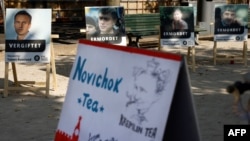Experts from a global chemical weapons watchdog confirmed Tuesday that the substance used to poison Kremlin critic Alexei Navalny was from the banned Soviet-style Novichok family of potent nerve agents.
The Organisation for the Prohibition of Chemical Weapons (OPCW) said that the biomarkers in Navalny's blood and urine had "similar structural characteristics as the toxic chemicals belonging" to the Novichok group.
Navalny was airlifted to Berlin for treatment after falling ill on a flight in Siberia on August 20. A number of Western governments called for an international investigation into the case, with many global leaders suspicious that the Russian government may have been involved in poisoning the prominent opposition figure. Navalny, 44, was discharged on September 23 and has vowed to return to Russia to continue with his opposition work after completing rehabilitation in Germany.
Russia has repeatedly denied accusations that it was involved in the incident and has widely rejected the medical findings by German military doctors that identified the nerve agent last month.
Moscow requested assistance from OPCW on October 1 to confirm the presence of poison. According to a statement of their findings, experts said that an analysis of the samples taken from Navalny prove that a nerve agent from the Novichok family was used against him.
In response to the OPCW findings, the German government said Tuesday that it would talk with European Union partners about its next steps in the investigation.
"Any use of chemical weapons is a serious matter and cannot remain without consequences," said German government spokesman Steffan Seibert.
"These results constitute a matter of grave concern," the OPCW said. "The use of chemical weapons by anyone under any circumstances … (is) … reprehensible and wholly contrary to the legal norms established by the international community."
The Kremlin was accused of using a similar nerve agent in a 2018 in an attempt to assassinate Sergei Skripal, an ex-Soviet spy and Moscow critic.
If Navalny's case is anything like the incident with Skripal, who acted as a double agent for the U.K., punishment could include financial sanctions against Russian officials.
In his first video interview since the poisoning, Navalny told prominent Russian YouTube blogger Yury Dud in a segment released Tuesday that the Kremlin critic believes Russian intelligence services are responsible for the attack.
Navalny went as far as accusing Russian President Vladimir Putin of ordering the poisoning.
In the video interview, Navalny alleges that he was targeted by Russian authorities that believed he posed a threat to Putin's ruling party in the following year's parliamentary elections. In recent years, the opposition activist has become one of Putin's most influential critics, in part because of his efforts to wage a combination of protests and anti-corruption campaigns against the Kremlin.






